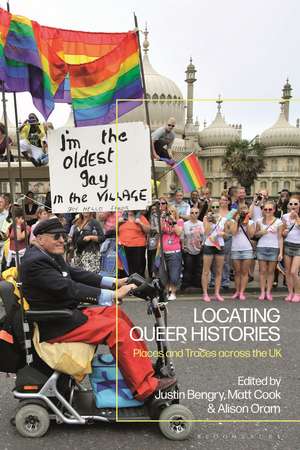Locating Queer Histories: Places and Traces across the UK
Editat de Dr Matt Cook, Alison Oram, Justin Bengryen Limba Engleză Paperback – 17 apr 2024
| Toate formatele și edițiile | Preț | Express |
|---|---|---|
| Paperback (1) | 190.24 lei 6-8 săpt. | +69.32 lei 10-14 zile |
| Bloomsbury Publishing – 17 apr 2024 | 190.24 lei 6-8 săpt. | +69.32 lei 10-14 zile |
| Hardback (1) | 538.77 lei 6-8 săpt. | |
| Bloomsbury Publishing – 2 noi 2022 | 538.77 lei 6-8 săpt. |
Preț: 190.24 lei
Preț vechi: 248.77 lei
-24% Nou
Puncte Express: 285
Preț estimativ în valută:
36.41€ • 37.79$ • 30.36£
36.41€ • 37.79$ • 30.36£
Carte tipărită la comandă
Livrare economică 22 martie-05 aprilie
Livrare express 18-22 februarie pentru 79.31 lei
Preluare comenzi: 021 569.72.76
Specificații
ISBN-13: 9781350252530
ISBN-10: 1350252530
Pagini: 200
Ilustrații: 11 bw illus
Dimensiuni: 156 x 234 x 25 mm
Greutate: 0.28 kg
Editura: Bloomsbury Publishing
Colecția Bloomsbury Academic
Locul publicării:London, United Kingdom
ISBN-10: 1350252530
Pagini: 200
Ilustrații: 11 bw illus
Dimensiuni: 156 x 234 x 25 mm
Greutate: 0.28 kg
Editura: Bloomsbury Publishing
Colecția Bloomsbury Academic
Locul publicării:London, United Kingdom
Caracteristici
Draws on a range of source material - from letters, diaries, memoirs, oral histories and TV interviews - to reconstruct the experiences of LGBTQ people.
Notă biografică
Matt Cook is Professor of Modern History at Birkbeck College, University of London, UK. He is the author of Queer Domesticities: Homosexuality and Home Life in 20th-Century London (2014) and London and the Culture of Homosexuality, 1885-1914 (2003).Alison Oram is Professor of Social and Cultural History at Leeds Beckett University, UK. She is the author of Her Husband Was a Woman!: Women's Gender Crossing and Modern British Culture (2007) and the Lesbian History Sourcebook (2001).Justin Bengry is Lecturer in Queer History at Goldsmiths, University of London, UK. His forthcoming monograph is entitled The Pink Pound: Capitalism and Homosexuality in 20th-Century Britain.
Cuprins
Acknowledgements List of Illustrations Introduction1. 'Great Expectations: Migrating to Edinburgh', Alva Träbert2. 'The North South Divide? Examining Queer Intersections between Newcastle upon Tyne and London', Gareth Longstaff3. 'Sectarianism and queer lives in Northern Ireland since the 1970s', Sean Brady4. 'Queer Transplanting from the Himalayas to Yorkshire: Reginald Farrer's Loves for Men and Alpine Plants (1880-1920)', Dominic Janes5. '"Cool and Green and Lovely Beyond Anything": Oxford's Parson's Pleasure 1844-1992', George Townsend6. 'Tracing Queer Black Spaces in Interwar Britain', Caroline Bressey and Gemma Romain,7. 'London Suburbs and the Co-Creation of LGBT+ Jewish Identities', Searle Kochberg and Margaret Greenfields,8. 'The queer politics and pleasure of community resistance to Section 28 on Brighton Beach, 1988-1994', Louise Pawley9. 'Taking Pride in Plymouth's Past', Alan Butler10. 'A "Queer Collection": The English Colony in Florence, 1890 - 1940', Rachel Hope Cleves Notes on ContributorsIndex
Recenzii
The theme of this book is that locality matters. Queer lives and queerscapes are illuminated across a multiplicity of places, spaces and times: from polities to gardens, synagogues, photography collections, racial interminglings, English beaches and Florence estates. Queerness is not so much about being as becoming, celebrating difference and belonging in all its varieties.
Locating Queer Histories provides an exquisitely rich, wide-ranging sampler of queer experiences. Methodologically and geographically varied, this work delivers on the promise of queer urban, regional, and provincial histories to engage us in revisiting familiar places from new perspectives, communities long omitted from history. Locating Queer Histories is a welcome challenge to the field and a promise of more to come.
This is another superlative offering from the 'Queer Beyond London' team of Bengry, Cook and Oram. The scholars they have assembled treat the reader to a rich diversity of topics about the fascinating heterogeneity of queer Britain. This is a collection to be savoured.
Locating Queer Histories provides an exquisitely rich, wide-ranging sampler of queer experiences. Methodologically and geographically varied, this work delivers on the promise of queer urban, regional, and provincial histories to engage us in revisiting familiar places from new perspectives, communities long omitted from history. Locating Queer Histories is a welcome challenge to the field and a promise of more to come.
This is another superlative offering from the 'Queer Beyond London' team of Bengry, Cook and Oram. The scholars they have assembled treat the reader to a rich diversity of topics about the fascinating heterogeneity of queer Britain. This is a collection to be savoured.
